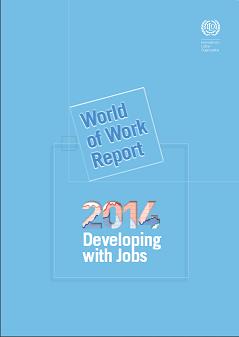ILO (2014) “World of Work Report 2014: Developing with Jobs“, International Labour Organization Research Department, Ιούνιος.
Since the eruption of the financial crisis in 2008 much of the global policy debate has focused on advanced economies and their ability to cope with the impacts of the crisis. During this period, a major policy shift has taken place in developing countries that has often gone unnoticed. Notably, in the face of the slowdown of their exports to advanced economies, developing countries have been confronted with the need to rebalance their economies and find new sources of economic growth and job creation.
This report draws out the many lessons that can be learned from this policy shift. First and foremost, it shows the considerable policy innovation among the over 140 emerging economies and low-income countries which are examined. The measures range from employment guarantee schemes to cash benefits for vulnerable groups and policies to promote formal enterprises. Some of these are being replicated throughout the developing world and have even had some attraction for a number of the advanced economies most affected by the financial crisis.
Second, a key finding emerging from the report is that good quality jobs matter for development. While it has long been argued that developing countries should concentrate efforts on trade and investment liberalisation and infrastructure spending, supported by external aid if needed, evidence presented in the report shows that such policies will not yield development unless accompanied by dedicated efforts to boost employment and decent work opportunities and tackle working poverty. In countries where it was implemented, such a policy shift not only helped development but also played a counter-cyclical role that helped attenuate the impacts of the financial crisis.
Third, governments in developing countries have gained confidence and therefore policy space. They have realised that there is no one size fits all solution to their problems and that remedies that used to be advocated (though not always applied) in industrialised countries are not necessarily what is required in a developing country context. Renewed interest among developing countries in well-designed employment regulation, minimum wages and social protection illustrate the point.
At the same time, huge challenges persist. Rising youth unemployment, including among new graduates, stubbornly high employment informality and significant income inequalities require urgent policy attention. In too many developing countries, including some emerging economies that have significant institutional capacity, core labour standards are not properly enforced. There are no independent trade unions in some countries, and employer organisations cannot operate effectively in other parts of the world.
In sum, “Developing with Jobs” highlights the relevance of the ILO’s mandate, values and policy tools. It also demonstrates clearly why decent work and social protection should be central goals in the post-2015 development agenda.
Σχετικές αναρτήσεις:
- European Commission (2014) “Convergence Report, European Economy 4/2014“, Economic and Financial Affairs, Ιούνιος: Βρυξέλλες.
- International Labour Organization (2014) “World Social Protection Report 2014/15, Building Economic Recovery, Inclusive Development & Social Justice“, International Labour Office Geneva, 03 Ιουνίου.
- European Commission (2014) “EU Anti-Corruption Report“, COM (2014) 38 final.




